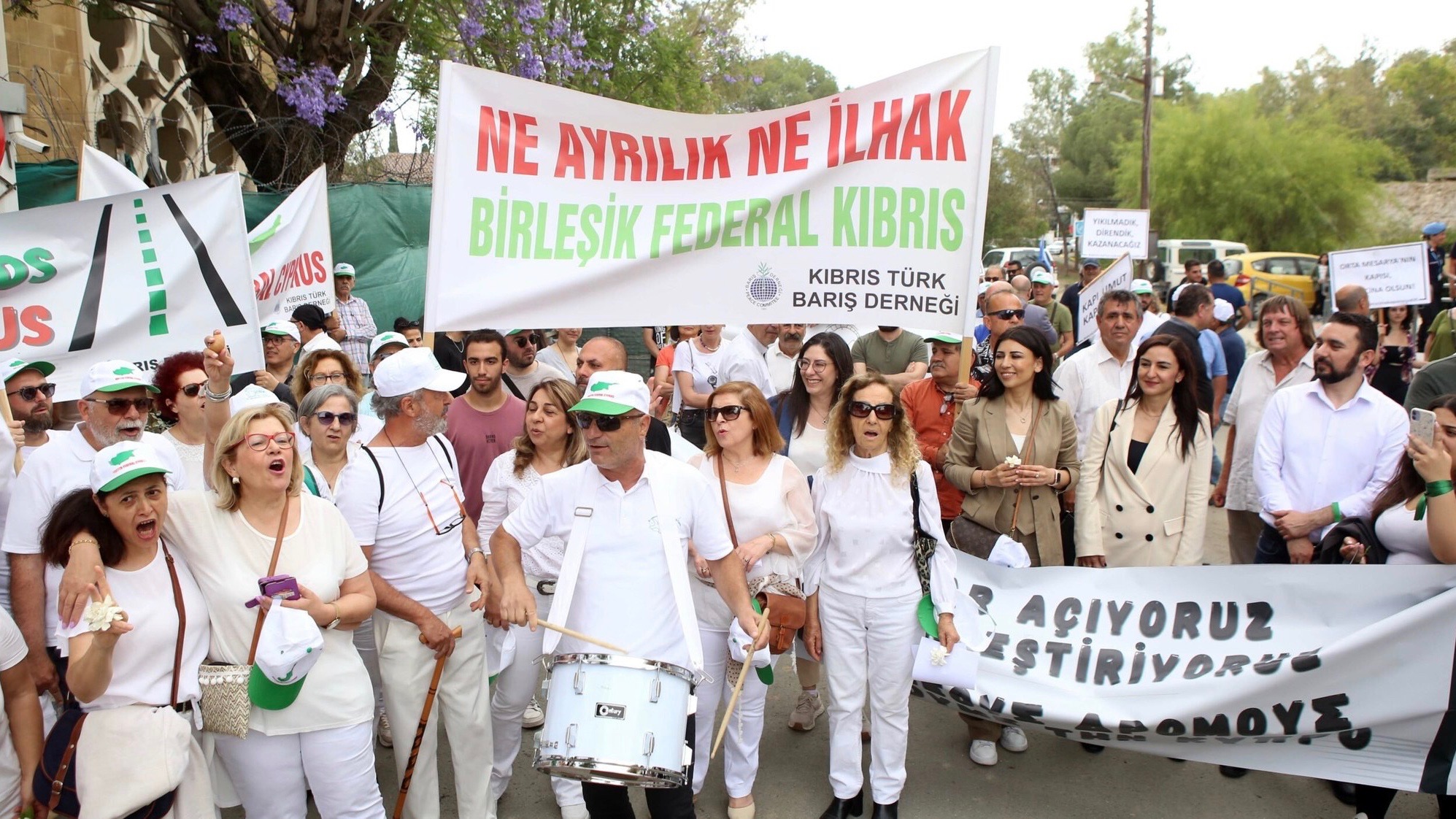Progressive sections in the Republic of Cyprus and in Turkish-controlled Cyprus organized a major demonstration on Saturday, May 27, to reiterate their resolve to secure peace and unity in the ethnically and politically divided island. On the call of groups including the Peace Generation United by Hope and the Bi-communal Peace Initiative United Cyprus, two demonstrations under the banner ‘Breaking New Ground – Reuniting Cyprus’ were organized on both sides of Green Line in the divided city of Nicosia.
Groups such as the Progressive Party of Working People (AKEL), United Democratic Youth Organisation (EDON), Cyprus Peace Council, Republican Turkish Party (CTP), CTP-Youth, Sol Hareket, Pancyprian Federation of Trade Unions (PEO), and POGO Women’s Movement participated in the march which moved from both sides towards the Ledra crossing point on the Green Line. The protesters called for opening up of new crossing points on the Green Line which divides Cyprus, and resolved to intensify the struggle for reunification of the country within the framework of a bi-zonal and bi-communal federal solution.
The Mediterranean island of Cyprus is currently divided into two zones. One forms the Republic of Cyprus with a Greek Cypriot majority, while the northern part of the island is under the control of Turkey, where Turkish Cypriots are in majority. The 180 km-long United Nations Buffer Zone or the Green Line that divides the island of Cyprus is the narrowest at Nicosia city, where only a few meters separate the two sides.
The British colonial administration that directly ruled Cyprus (1914-1960) purposefully tried to divide the islanders along ethnic lines in order to weaken the independence movement. Even after attaining independence from the British in 1960, ethnic tensions prevailed on the island between Greek and Turkish Cypriots. Hyper-nationalists on both sides, with the backing of the Greek and Turkish establishments, confronted each other, causing the escalation of the ethnic conflict during 1963-64.
In 1974, a coup backed by the Greek military and the Turkish military’s response resulted in the de-facto division of Cyprus on ethnic lines and the internal displacement of thousands of Cypriots. On November 15, 1983, the Turkish-controlled northern areas of Cyprus unilaterally declared independence and proclaimed the establishment of the Turkish Republic of Northern Cyprus, which was recognized by Turkey but rejected by the Republic of Cyprus and the UN, among others.
Even though many rounds of talks have been held between the political leaderships of the Republic of Cyprus and Turkish Cyprus, they have been hindered by far-right and hyper-nationalist sections and parties on both sides. On the other hand, progressive sections on both sides have been calling for a federal solution for the reunification of the country.
The tightening grip of Ankara on Northern Cyprus’ affairs under President Recep Tayyip Erdoğan is also a major hindrance in the path of peace. Many progressive political figures and journalists in Northern Cyprus have been facing persecution by the authorities for their criticism of Erdoğan. Despite such repression, progressive sections and peace groups on both sides continue to strive for peace and unity.
In his statement on May 27, Stefanos Stefanou, the general secretary of the Progressive Party of Working People (AKEL), said that “AKEL participates in today’s event held by a number of Greek Cypriot and Turkish Cypriot organizations to support the opening of more crossing points that will further facilitate contact between Greek Cypriots and Turkish Cypriots.”
“Meanwhile, we stress that opening the barricades is not the only solution to the problem. The existing problems will be radically resolved through the solution of the Cyprus problem. A solution within the framework of a bi-zonal, bi-communal federation with political equality as defined by the United Nations, but until the solution is reached, all those measures should be taken that will help build trust between the two communities and at the same time will send a message about the need to reach a solution,” he added.
While addressing the mobilization on Saturday, the leader of the Sol Hareket, Abdullah Korkmazhan, said that they were continuing the struggle for opening new crossing points, unification of the island, and improving international relations. “We want a Cyprus with no barricades and where all our citizens live freely,” he said.





